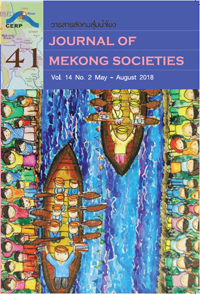Masculinity, Matrilineality and Transnational Marriage
Main Article Content
Abstract
Studies of transnational marriage tend to focus on the women and men engaged in these relationships, while ignoring the experiences of those who are not involved in, but who influence and are affected by such marriages. This article focuses on Thai men in Isan (the Northeast region) who are not engaged in these marriages and explores how transnational marriage has affected or altered masculine identities and subjectivities and how local men have negotiated the ongoing changes. It also discusses the dynamics of masculinities taking place in the context of matrilineality and patriarchal gender relations in Isan communities where these marriages are embedded. Qualitative research methodology was employed and fieldwork was conducted in 2016-1017 in an Isan village in Khon Kaen province. The findings show that the current transnational marriages have brought new challenges to Isan masculinities by highlighting male breadwinner ideals and ‘masculine culture’ practices. The ways in which village men have articulated and negotiated these changes are influenced and constrained by socio-economic conditions as well as by breadwinner ideals and matrilineal cultural principles regarding gender relations and status. The article also reveals that transnational marriages have reproduced patriarchal gender privilege, allowing local men to justify their incompetence in adhering to breadwinner ideals.


